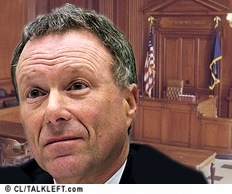Empty Wheel says the judge also discussed jury instructions today -- those that will be given to jurors at the conclusion of the case.
Team Libby did not get what they wanted on the memory instruction. There will be one, but it will be weaker than they had hoped. The judge won't reconsider his decision to allow Libby's memory expert to testify.
Both sides submitted a description of the case to be read to the jury. Here is the one (page 3) Fitz wanted:
According to the indictment, the government began an investigation in September 2003 into possible unauthorized disclosures to various reporters of classified information regarding the CIA employment of Valerie Wilson, the wife of Ambassador Joseph Wilson, in the spring of 2003.
The indictment charges that, during the course of this investigation, defendant I. Lewis Libby, then Chief of Staff and National Security Advisor to the Vice President of the United States knowingly and willfully made false and material statements during two interviews with FBI agents in the fall of 2003, and that Mr. Libby knowingly and willfully provided false testimony under oath during two appearances before a federal grand jury in March 2004. The indictment further alleges that, by deliberately providing false testimony to the grand jury, Mr. Libby corruptly endeavored to obstruct the due administration of justice.
The Judge is still considering which definition of "materiality" he will give to the jury. On page 14 of Fitz's filing above, he says the Government objects to Libby's proposed instruction #12:
Thus, the jury must determine whether the statement could influence a decision or
action of the FBI, not whether it could “impair or pervert the functioning of the FBI.”....
....Nor should the jury be instructed that it must determine whether the fact or facts to which the
statement relates are “important” or “trivial,” in a general sense. The use of the undefined terms
“important” and “trivial” is particularly confusing and potentially misleading in the context of the arguments that are expected to be made in this case. Defendant will argue that information regarding Ms. Wilson and his conversations regarding this information were not sufficiently important for him to remember it. It is important that the jury not be led to confuse that issue with the question of whether the defendant’s statements could have influenced the FBI in its investigation. The government objects to this additional language, and requests that the Court instruct the jury regarding the term “materiality” using O’Malley § 40.07.
In Empty Wheel's live-blogging this morning, she writes:
There is still a dispute regarding an addition regarding materiality requirement. [Libby has been trying to push hard on the materiality, preparing to argue, I suspect, that the alleged lies that Libby told were not material to the investigation in the case.] Walton is discussing the definition of trivial, which seems to be the way he will deal with the materiality. Will leave it as he has drafted it.
Also, in case anyone is wondering how I decide whether to quote from Fitz's or Libby's pleadings, the answer is that I quote from whichever I can select text from. Although all pleadings are filed in pdf format, some, particularly Libby's, don't allow me to select text. In those instances, I link to Libby's pleading but quote from Fitz's corresponding pleading which describes Libby's position. I have uploaded each side's relevant pleadings to the TalkLeft server. Anyone interested in exactly what Libby's lawyers wrote can click on the link provided and read it for themselves. I hope that makes sense.




